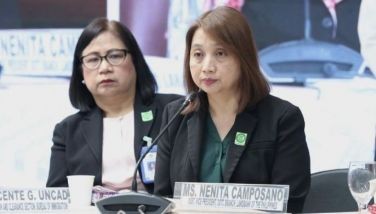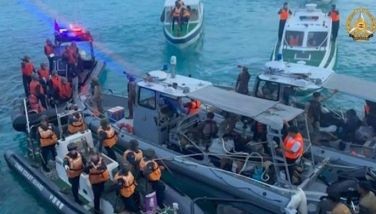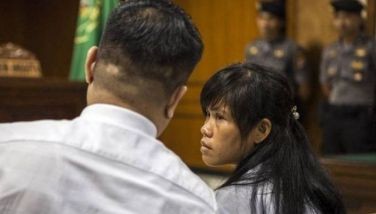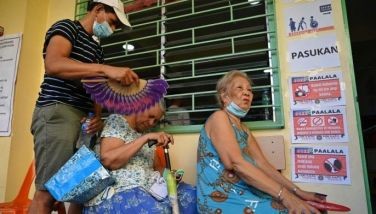Duterte admits death squad
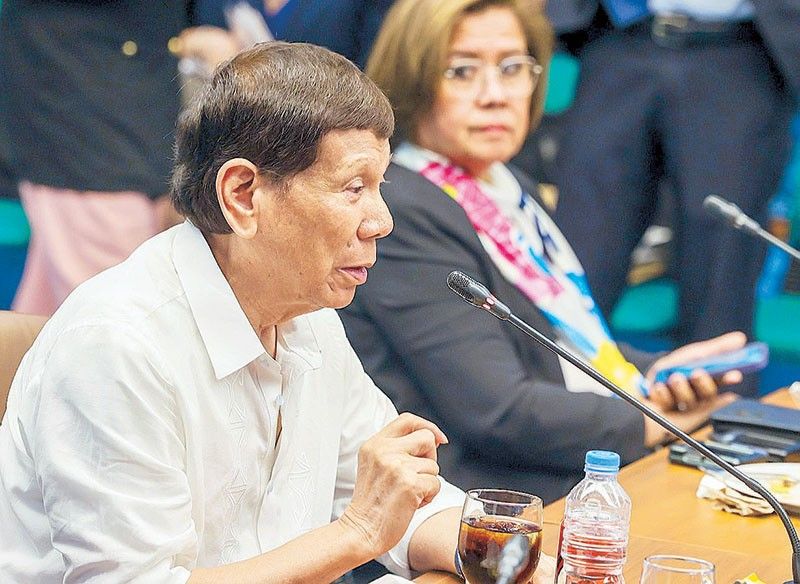
• Squad made up of gangsters, not police
• Rody takes full legal, moral responsibility for drug war
• Garma lying, no reward system
MANILA, Philippines — In an expletive-laced defense of his bloody war on drugs, former president Rodrigo Duterte yesterday admitted having organized a death squad against criminals, but claimed it was composed not of police officers but of “gangsters” and wealthy persons who liked killing.
Aided by a walking cane, Duterte attended the Senate Blue Ribbon subcommittee investigation wherein he also admitted “full, moral and legal responsibility” for the killings in his brutal crackdown on the drug scourge.
“Thousands were killed when I was mayor, but they are criminals. I can make a confession now, if you want. I have a death squad. But they are not composed of police. They are gangsters,” Duterte, 79, said in his rambling and profanity-laden answers to senators who questioned his alleged state policy of ordering deadly operations against low-level drug pushers and users.
His alleged death squad was composed of “gangsters” and not police officers, Duterte said, because he did not want his officers to risk suspension if they killed a drug suspect.
“Do not question my policies because I offer no apologies or excuses. I did what I had to do. I did it for my country. The war on illegal drugs is not about killing people. It is about protecting the innocent and the defenseless,” he said.
“For all its successes and shortcomings, the drug war was not a perfect one. I want to leave this behind to the Filipino people, because I would never have another chance in the future. I – and I alone – take full, legal and moral responsibility,” Duterte added.
He also denied allegations made by retired police colonel Royina Garma that he implemented a cash reward system for police officers who killed drug suspects.
Duterte also denied asking Garma to recommend an Iglesia ni Cristo member in the police force to help replicate nationwide the Davao model of the drug war.
Garma begged off from yesterday’s hearing as she was on medical leave, according to Senate Minority Leader Aquilino Pimentel III, who presided over the hearing.
The former president also denied ordering his Philippine National Police (PNP) commanders to kill a defenseless drug suspect, although he said he encouraged the police to make a suspect fight back so that “there is one less criminal to worry about.”
Those he would kill himself, Duterte said, are police officers who are involved in illegal drugs and syndicates.
“In the fulfillment of duty, I told the police, I will die for you. But if you get involved in crime, son of a b***h, I will be the one to kill you! I am unforgiving,” Duterte said in Filipino.
Foul language
Duterte’s foul language did not sit well with Sen. Risa Hontiveros, who zeroed in on what she called a “bombshell” admission from Duterte that he had a gangster-led death squad.
“Is it the job of a police officer to kill suspected criminals? And to urge the PNP to encourage a suspect to fight back? It is very incorrect for a police to do,” Hontiveros said.
“There were killings, but it was not state-sponsored. There was never an official order to the police or military or agents of government to kill. I never said such an order, because I am a lawyer. What I am saying is, in your fulfillment of your duty, just apply elements of self-defense,” Duterte said.
“Death squad is a very loose term to use. But for me to order to assassinate a person who is tied up? What I said was for them to encourage the criminals to fight, to encourage them to draw their guns. That is my instructions – encourage them to fight, so that when they fight back, you can kill them, so there won’t be any problem anymore,” he added.
“It is unacceptable for a former president to say a suspect should be killed, because we have due process,” Hontiveros said.
Duterte said he only wanted suspects killed “if they fight back,” telling Hontiveros: “That is my stand, and if you don’t agree with me, I’m sorry.”
When Hontiveros pressed him about the structure of this death squad, Duterte evaded the question. “I am now 73, for the life of me, I cannot remember their names,” he said, misstating his age.
But Duterte tagged the high-ranking police officials in attendance at the hearing as “commanders” of his death squad because they had served as Davao City police chiefs. He was referring to Sen. Ronald dela Rosa, retired general Vicente Danao and former Dangerous Drugs Board chairman Catalino Cuy.
“I think he is just joking,” Danao said when asked about being a Davao death squad commander.
Former senator Leila de Lima – detained for over six years on drug charges that were later dismissed – said Duterte’s admission only confirmed the existence of the death squad, which she had also investigated when she was human rights chair.
De Lima’s take
De Lima sat on the same table with Duterte, separated only by a chair occupied by former Philippine Drug Enforcement Agency chief Aaron Aquino.
“We all heard from the horse’s mouth that there are indeed death squads, and pointed to certain former Davao police chiefs. This is all clear about the death squad, to liquidate suspected criminals,” De Lima said.
“Inducing or encouraging people to kill, directly or indirectly, is not part of a duty of an executive official, whether mayor or president. It is clearly the Davao death squad,” she added.
Confronted by his critics, Duterte dared them to file a case against him in court, so he could take responsibility.
“Mine and mine alone. Investigate me. Not the police,” Duterte said.
The former president apologized if he had appeared “rude” in his demeanor at the Blue Ribbon subcommittee hearing.
“I really am rude and shameless. But I do have some decency. I just want to express my anger at criminals!” Duterte said, banging his hand on the table.
Duterte and his former PNP chief Dela Rosa are facing an International Criminal Court investigation for crimes against humanity in the drug war deaths.
Also at yesterday’s hearing was an uncle of teenager Kian delos Santos, a victim of extrajudicial killling. Randy delos Santos confronted senators allied with Duterte about their support for the violent drug war that killed his nephew in 2017.
Delos Santos, now a field coordinator for the church-based rehabilitation program Paghilom, attended the hearing to represent the victims of Duterte’s anti-narcotics crackdown.
“We were able to prove in court that Kian was killed by police,” Delos Santos said, referring to Caloocan police officers Arnel Oares, Jeremias Pereda and Jerwin Cruz, who killed Kian in a staged police operation in August 2017.
Delos Santos confronted Dela Rosa about falsely tagging Kian as a “drug runner” when he was PNP chief.
Kian’s uncle also confronted Sen. Robin Padilla, saying the latter’s mother is his fellow Jehovah’s Witness follower.
“You may have questions about Kian’s character. But he was not selling drugs. He was innocent. He was studying at a private school,” Delos Santos said of Kian, who was heard by witnesses crying for help, saying he still had an exam to prepare for.
Dela Rosa expressed condolences to Kian’s uncle, saying that the 17-year-old was only tagged in illegal drugs according to police because the store he was minding had apparently been used as a trading post for drug pushers and users.
“We may have won at the trial court, but we have yet to receive the damages. We have yet to attain full justice,” Delos Santos said.
At the hearing, three former PNP chiefs clarified that the words “negate” and “neutralize,” which appeared in police circulars issued by Dela Rosa, did not mean killing as insinuated by some groups.
‘Negate and neutralize’
Lawyer Chel Diokno, one of the resource persons, raised the issue of the PNP’s use of the terms which, he said, some police officers apparently defined as killing.
Dela Rosa disagreed with Diokno and instead asked his fellow former PNP chiefs, retired generals Archie Gamboa, Debold Sinas and Danao, how they defined “negate and neutralize.”
Dela Rosa, citing a 2021 police operational manual, said “police meaning of neutralization, a police intervention in strict accord with the use of force continuum and/or principle proportionally on the use of force purposely to contain or stop the unlawful aggression of the offender, this may include arrest, capture, surrender or other action to subdue the suspect.”
But Diokno said the operational manual came years after Dela Rosa’s circular, where the terms negate and neutralize were used.
Meanwhile, quad comm leaders yesterday dismissed as “lies” the allegations that they coerced a police official to support testimony related to the controversial reward system in the drug war.
Police Col. Hector Grijaldo said at the Senate hearing yesterday that he was “forced” by quad comm co-chairs Representatives Dan Fernandez and Bienvenido Abante Jr. on Oct. 22 to allegedly sign an affidavit backing claims by Garma on the alleged reward system.
Grijaldo alleged he felt “corrupted to make that statement” under pressure from the lawmakers.
Fernandez called Grijaldo’s account “lies of the highest level” and an attempt to undermine the quad comm’s ongoing investigation.
“This is their way to discredit the quad committee, but the truth will bail us out. Nothing will prevent us from pursuing justice for all the lives lost,” Fernandez said.
Fernandez explained that Garma herself had suggested Grijaldo’s involvement, believing he had knowledge of the alleged reward system.
Abante also denied Grijaldo’s accusation. “There is no truth to the accusations that I forced anyone to sign any affidavit in exchange for favors or the possibility of promotions,” Abante, who chairs the House committee on human rights, said.
Following Grijaldo’s testimony, Duterte announced during the Senate hearing that he would file a “subornation of perjury” case against Fernandez.
“Carry on; nothing will prevent us from pursuing the truth of all the killings,” Fernandez said.
“In the end, we believe the truth will come out, and those responsible will ultimately be held accountable for these heinous crimes against our people,” Abante said. — Delon Porcalla, Diana Lhyd Suelto, Emmanuel Tupas
- Latest
- Trending

















